
How Honest is Too Honest? 6 Books That Straddle That Line
Michael Leviton Recommends Richard Wright,
Joyce Maynard, and More
I grew up in a family I refer to as “our little honesty cult” in which being liked wasn’t nearly as important as being “authentic.” In fact, being liked wasn’t important at all. My parents were rebelling against their own upbringings in which they were discouraged from expressing themselves and pushed to be “normal,” to fit into society, and pretend to be whoever others wanted them to be. Dad called it “following the script.” My parents led by example, by being themselves, and I inherited their lie-colored glasses, their vision of most common social practices as dishonest. I spent my childhood as an expert lie-spotter.
When I say I was off-puttingly truthful for decades, many assume that I used honesty as an excuse to insult people; I’m aware that there are many “just being honest” people who do that. My honesty did occasionally offend, like when I’d admit I’d forgotten someone’s name or if I didn’t feign interest when bored. But my honesty mostly just made people uncomfortable. I’d ask inappropriate questions, cry in public, gush to someone about how much I liked them, tell overly personal stories to any stranger. I suspect most would have preferred to have been insulted.
My honesty poisoned almost anything that involved other people. I couldn’t get or keep a job. Whenever I managed a friendship or romance, it was turbulent. Eventually, my candor had caused enough chaos that I decided to retrain my brain to lie.
For my Dad, one of the worst things you could say about a book was that it was “pandering.” It wasn’t uncommon to hear him mock a book for being a transparent ploy to gain attention and prestige, inspired not by a need to express but by desperation to be liked. So, growing up, I was always evaluating whether the books I read were “honest,” according to my family’s bizarre and extreme definition. I’ve spent the last ten years trying get away from my family’s tragic love affair with honesty, but I thought it would be fun to compile a list of the books that read to me as especially honest.
*
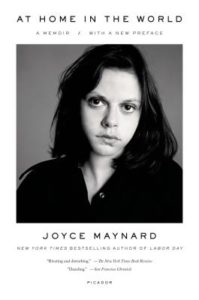
Joyce Maynard, At Home In The World
(Picador)
This memoir tells the story of how Maynard’s upbringing led her to a teenage romance with 53-year-old recluse J.D. Salinger and how that experience influenced the rest of her life. As is the fate of most “too honest” books, this one was met with a lot of vitriol. When it came out, Maynard noted that many critics attempted to insult her with the same script, repeatedly referring to her as “shameless” as if shame were a good thing. Her memoir is very much about unlearning the shame that she was unfairly taught to carry and the critics responded by calling the book “shameless!” When criticized for maligning Salinger, Maynard pointed out that our culture often considers exposing wrongdoing worse than wrongdoing itself. At one of my favorite moments in the book, Maynard confronts Salinger and gives him a chance to tell his side of the story. Truth-tellers often do this –I used to all the time– and barely anyone accepts the invitation. There’s a big difference between those who long to tell their story and those who would never tell their story in a million years.
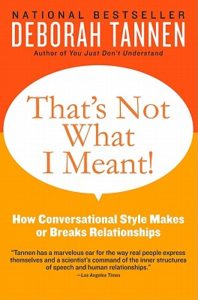
Deborah Tannen, That’s Not What I Meant
(William Morrow and Company)
Tannen is a linguist who specializes in identifying and categorizing different styles of communication, but she became a linguist to unravel the communication issues that led to her divorce, so her personal mission often makes this feel strangely like memoir. Tannen suggests that whatever communication style we ended up with probably feels like the only correct one, that anyone communicating differently appears to us as foolish, insane, or evil. Over the course of the book, she tells enough personal experiences that we get a vision of what the world looks like to a communication expert and I find her a riveting character. Tannen doesn’t really make jokes and yet I can’t remember a book that made me laugh this much. Her zooming out on social life feels like a sharper way to express what most great literature tries to. I get the sense from her personal anecdotes that her analysis really bothers people, that she’s often attacked by those who insist that they alone know what’s rude and what’s polite, what’s invasive and what’s friendly, what’s kind and what’s manipulative. As I read, I found that this book explained most things that have gone wrong in my life, solving nearly all my long obsessed-over interpersonal mysteries. I know that’s an absurd level of praise for a book, but I’m not even exaggerating.
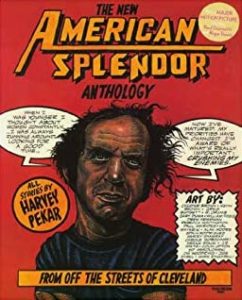
Harvey Pekar, The New American Splendor Anthology
(Running Press Adult)
Harvey Pekar wrote comics about his mundane and often unappealing life. Sometimes he’d drop the whole concept that he was supposed to be telling personal stories and would spend a comic just ranting or complaining. I remember he once devoted a whole comic to his resentment of elderly people who took too long in the supermarket line. As a person, Pekar had very few positive qualities: he was bitter, unattractive, and charmless by any conventional definition. But I fell in love with his need to express himself even when he assumed no one would listen or care. When I was a child, my Mom used to sit me down in front of a tape-recorder to improvise on tape. I could sit there raving alone for an hour, just out of the joy of speaking. Mom put the “Michael Talking Tapes” into a tape-player next to my bed so I could be lulled to sleep by my own uncensored voice. I don’t know how Pekar ended up this way, but it’s clear from the episode in which he has a problem with his vocal cords and loses the ability to speak, that this was a man who needed to express himself, who had little else to live for.
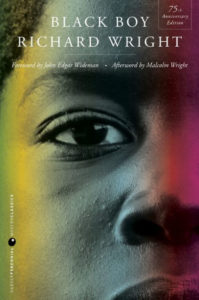
Richard Wright, Black Boy
(Harper Perennial)
Wright’s memoir tells about his brutal experiences growing up in the South in the early 1900s. When I read this as a teenager, I was especially haunted by Wright’s portrayal of what it took psychologically to get himself to the point of being able to tell his story. I was struck by a scene when young Wright read Sinclair Lewis and found validation of one of his life-long observations: that white people were ridiculous and could be laughed at. Wright obviously couldn’t publicly laugh at a white man or point out white ridiculousness; doing so could get him imprisoned or killed. But I’d naively assumed that he’d still laugh freely in his hidden thoughts; I’d underestimated the extent to which Wright had been gaslit into doubting his own observations, convinced to lie to himself on behalf of his oppressors. The physical and emotional violence he endured was designed to scare away his sense of reality, the source of his voice. This memoir’s existence was inherently hopeful because it meant Wright had defied a culture murderously devoted to silencing him. My honesty had never been punishable by death.
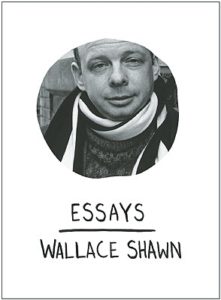
Wallace Shawn, Essays
(Haymarket Books)
Wallace Shawn opens his bluntly-titled book of essays with The Quest For Superiority in which he confesses one horrible thing about himself after another. This is especially impressive to me because Shawn comes across as such a kind, loveable guy; he could’ve gotten away with all the worst parts of his internal life if he’d just kept his mouth shut! But I suspect Shawn just couldn’t stomach commenting on others or our society without first scrutinizing himself. A lot of fairly honest people are willing to overshare about plenty of personal stuff—weakness, traumatic experiences, insecurity—but will stop before describing their atrocious secret thoughts.
In my honest days, I used to similarly lead with lists of my unlikable qualities, especially on job interviews and first dates. When writing my own memoir, I had to resist the impulse to just write all the worst things I’d ever done, even if they weren’t particularly relevant or entertaining. But I couldn’t let myself be too inspired by Shawn. Though some might be freaked out by his confessions, he has a magical way of still coming off as endearing. My job interviewers and first dates would not have said the same about me.
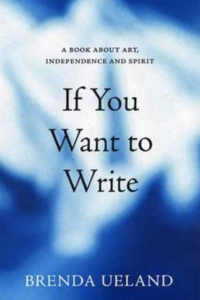
Brenda Ueland, If You Want To Write
(Graywolf Press)
Ueland’s book about how to write feels more to me like a book about how to be honest. She starts off describing the ways children express themselves just for fun, spending hours making fake tickets and posters for plays they’ll perform for no audience. She argues that inspiration is socialized out of us and replaced with desire to please an audience and get paid. To be artists, we had to get back to being like children. Ueland reminded me of my parents. By the time I read this book, I’d spent over a decade working with kids; it had always gone much better than working with adults. She drew my attention to the possibility that maybe I preferred being around kids because they were more honest.
One of my favorite parts was when she reproduced Van Gogh’s first drawing. It was from a letter to his brother, Van Gogh’s attempt to share what the sunset looked like to him. Though she did emphasize that sharing your point of view and feelings could help you connect with others, I focused more on her suggestion that having an audience wasn’t necessary. This went straight to my brain’s pleasure center; I wanted to believe I could just be honest and everyone else would have to deal with it.
Van Gogh’s social problems seemed even worse than mine. Once, I found a wonderful photo of Brenda Ueland looking charmingly unhinged with wild white hair and a suit that reminded me of Beetlejuice’s and I had the idea to print it on a t-shirt with “What Would Brenda Ueland Do?” But I didn’t have money to make t-shirts, partially because I was already doing what Brenda Ueland would have done. I do think the advice in this book is beautiful and perfect for other people; so many would find this kind of artistic honesty so freeing! It just happened that the advice I needed was the opposite; Brenda Ueland telling me to be honest was like telling an alcoholic he’s more fun when he’s drunk.
__________________________________
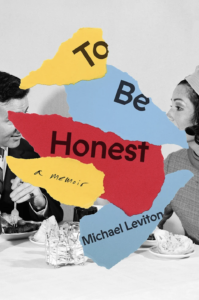
To Be Honest: A Memoir by Michael Leviton is available now via Abrams Press.
Michael Leviton
Michael Leviton is a writer, musician, photographer, and storyteller. He is the host of the storytelling series and podcast The Tell. He has worked as a screenwriter and contributed music to television shows, including HBO's Bored to Death.



















